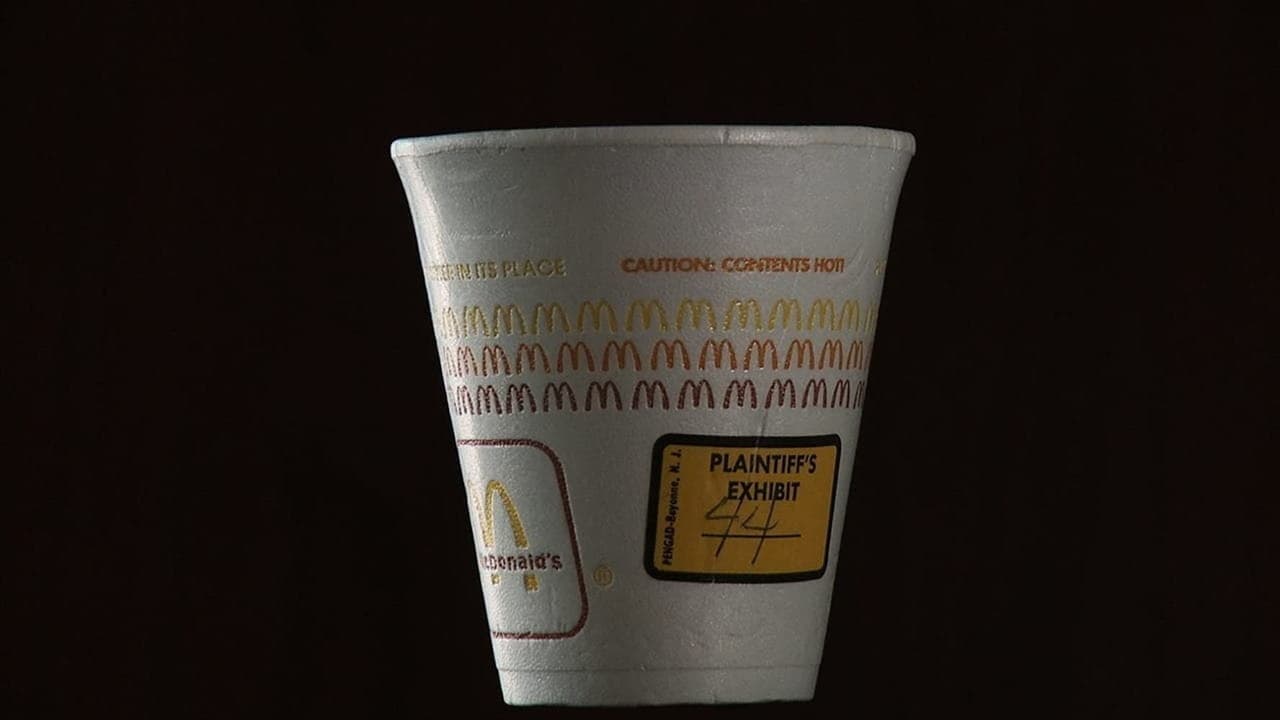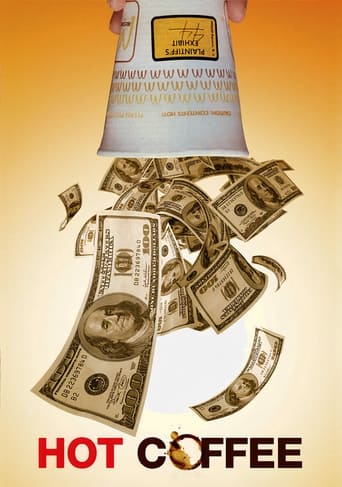

It took me a few minutes after watching this "documentary" to remember that my mother used to visit friends or have them over, and they were all serving each other tea which they made by boiling water (212 degrees Farenheit...or 22 to 32 degrees hotter than MacDonald's coffee), pouring it into a flimsy teacup and handing it to each other. If any of the ladies had fumbled the tea onto their lap right after the boil, it would have left even worse burns than the old lady in the documentary suffered. I guess that would have been the fault of whomever was serving tea that day! This film was a good example of a public relations effort by the Democrat National Committee or the Obama re-election campaign, but its inability to deal with contrary views (other than as being summarized in a smarmy manner and thrown away as a paper tiger) shows how weak the effort was.
... View MoreThe story of the New Mexico woman who spilled coffee on herself and sued McDonald's was widely viewed as the stuff of comedy, but it turns out that the story goes way beyond that. Using bumper sticker phrases like "tort reform" -- often conceived by the likes of Frank Luntz and Karl Rove -- the special interests sensationalized stories of "frivolous lawsuits" and convinced state legislatures to make it harder to sue, while also placing caps on damages, installing business-friendly judges, and often creating mandatory arbitration (signing away your right to sue).Susan Saladoff's documentary "Hot Coffee" looks at these issues. Saladoff organizes it like Michael Moore's documentaries (interviews with the subjects interspersed with cultural icons). Among other things, people often voted for tort reform without realizing that they were the ones getting screwed. Not only that, people often don't even know what a tort is.The point is that our justice system has gotten completely manipulated. See if you don't feel a chill run down your back while watching this.
... View MoreHow does big business turn a multi-million dollar pay-out into a substantial coup for industry and a devastating blow for the civil justice system? Quite easily, according to Susan Saladoff's 'Hot Coffee'.On February 27, 1992, Stella Liebeck, a healthy, active 72 year-old woman spilled a cup of boiling hot McDonald's coffee on her inner thigh. Suing McDonald's for damages, she was awarded $160,000 in medical damages and $2.7 million dollars in punitive damages by a jury; a trial judge would later reduce the award, and the two parties settled confidentially. In the meantime Liebeck and her cause were being pilloried by the nation's media - how, they said, could a company be liable for the mishandling error of a patron?Big business latched onto this wave of public opinion to condemn, in a widespread and well- financed media campaign, the rising tide of so-called 'frivolous lawsuits' eating away at the profits of all businesses. 'Tort reform' became the new catch-cry of this push - 'tort' meaning a 'harm' essentially - as industry used its leverage to encourage politicians, judges and the public alike to get behind new regulation that would make pay-outs like the one to Stella Liebeck a mere memory. The problem with this lies between the lines of the Liebeck case. Court photos detailing the extent of Liebeck's injuries - which required two separate skin grafts and over $100,000 worth of medical costs - are horrifying, as are the revelations that McDonald's had received over 700 unanswered complaints about the potential for injury with their standardized coffee temperature. That the jury came down so vehemently on the side of the plaintiff, and the corporation lowered their temperature standard in the wake of the case demonstrates not that this was not the 'frivolous' lawsuit painted in the media, but an appropriate and necessary use of the civil justice system.Not content to rest on this relative bombshell - I for one was embarrassed at my lack of knowledge of the Liebeck case - Saladoff charts how the case was used to systematically introduce US-wide 'tort reform', in the manner of both 'caps on damages' and 'mandatory arbitration' clauses in contract. These 'reforms' ensure that big business is protected from not merely the very few con artists seeking to extort them out of money (of which Liebeck is not one), but also the majority of whom have a reasonable and justified case to put forward to a civil court.The tragedy is this whole sage is not that Liebeck received such a pay-out, but that with these new misnomers of 'reforms', the likes of Liebeck are no longer sufficiently protected from the rich and powerful. Accountability is gradually being eroded, with the tacit consent of the people no less.Concluding Thought: How have I gone this long without knowing the context of the McDonald's case? Should I have been more diligent and found out myself, or can I blame the media?
... View MoreLet's get a couple of facts out of the way that this "documentary" never bothered with. From a taste standpoint, coffee has to be brewed just off the boil, which means at 195 to 200 degrees Fahrenheit, and you can not find anyone serious about good coffee who will disagree with that. Secondly, when someone hands you a cup of hot coffee, it's your responsibility to deal with it, to avoid injuring yourself with it. If someone hands you a loaded gun, and you shot yourself in the face, who's fault is that?Yes, this woman screwed up, she dumped a cup of very hot coffee in her lap. How the hell is that McDonald's fault? Because they sold coffee that is hot? Hells, bells, their customers EXPECT hot coffee.My brother when he was two years old, pulled a freshly brewed cup of hot coffee my dad had just set down for a second onto to himself and was hospitalized with burns all over his body. Gosh I wish we could have thought of someone to sue, because we'd be rich forever. This stupid woman poured hot coffee all over herself and sued the pants off McDonalds. And won.And this STUPID PIECE OF PROPAGANDA tries to make us believe that's justice. It's not justice. It's a set of tragedies. This woman was burned beyond belief and spent months in pain for a mistake SHE made. That's the first tragedy, but there's only one person who could have prevented it. The second tragedy is that a court of law inexplicably gave this woman millions of dollars of OTHER people's money for making a mistake that none of those other people could have prevented.And yet this film tries to convince us that's justice.It's not justice. It's extortion.
... View More